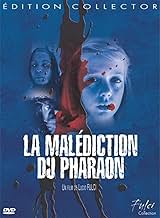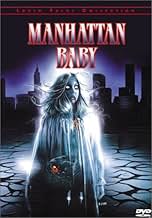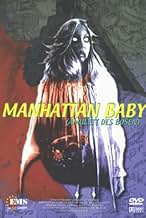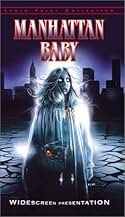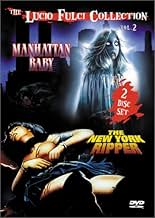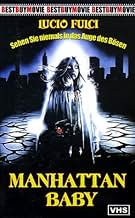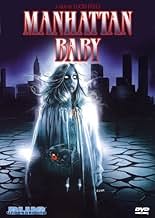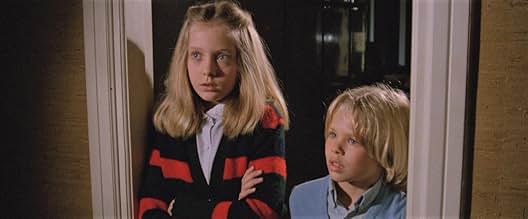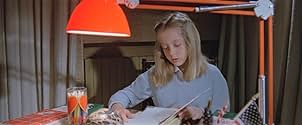AVALIAÇÃO DA IMDb
4,8/10
3,5 mil
SUA AVALIAÇÃO
Adicionar um enredo no seu idiomaAn archaeologist opens an Egyptian tomb and accidentally releases an evil spirit. His young daughter becomes possessed by the freed entity and, upon arrival back in New York, the gory murder... Ler tudoAn archaeologist opens an Egyptian tomb and accidentally releases an evil spirit. His young daughter becomes possessed by the freed entity and, upon arrival back in New York, the gory murders begin.An archaeologist opens an Egyptian tomb and accidentally releases an evil spirit. His young daughter becomes possessed by the freed entity and, upon arrival back in New York, the gory murders begin.
- Direção
- Roteiristas
- Artistas
Laura Lenzi
- Emily Hacker
- (as Martha Taylor)
Cosimo Cinieri
- Adrian Mercato
- (as Laurence Welles)
Enzo Marino Bellanich
- Wiler
- (as Vincenzo Bellanich)
Tonino Pulci
- Orderly
- (as Antonie Pulci)
Martin Sorrentino
- Caretaker
- (não creditado)
Avaliações em destaque
Hey - it's 1980 and Mr. Fulci wishes to do something 'not so horror'. So he created this tale about an Egyptian amulet which brings terrible tragedy to a New York family. I've seen about 15 of these Italian post-giallo horrors now from Fulci, Bava and of course, Argento. I found this one to be relatively well-dubbed and paced. In other words, the pace wasn't infintessimal and the actors didn't break from Italian into dubbed English and vice versa. For all I know, this was recorded in English given its title. Anyway, the two children in the film are strikingly eerie, remniscent of Village of the Damned's little miscreants, though the boy's voice seems very off (the only exception to my comment about the dubbing)- check out his first few lines in the park in "Manhattan"! Hilarious! The plot, while somewhat draggy as all of these films are (other societies don't demand a new scene every 2.5 minutes and either dialogue or action at all times it seems), it's not that slow. Of course these films are often watched for the unflinching depictions of gore that Italians are not afraid to deliver, and while the violence is a bit more subtle in this one than most, there are three scenes which will satisfy this type of viewer. Ultimately, this film's worst trait is its attempt at more 'psychological' horror in my opinion. However, it is not bad - as long as you are used to these Italians and their significantly different motivations and backgrounds from American directors. Oh, and as you might expect from Fulci, the cinematography is spellbinding at times.
"Manhattan baby" is another supernatural horror movie shot during the Maestro's most prolific period.
The movie being accorded only a fraction of the planned budget, it never had the chance to become what its makers probably intended.
Still it contains some beautiful surrealistic and atmospheric scenes which are worth watching. The opening scene in Egypt is just marvelous and keeps up with Fulci's best work. After the Hacker family returns to New York, the little daughter experiences contact with evil through the amulet she got in Egypt. This allows Fulci to devise the movie like "The Gates of Hell" or "The Beyond", meaning as a succession of loosely related scenes depicting strange occurences. Some of those scenes are interesting, such as the snake attack and the blood stains on the wall, announcing the return of "poor Jamie Lee". Others are ridiculous, like Adrian Mercato winding in spasms on the ground. The final attack by stuffed birds is spoiled by the visibility of the wires (in good tradition of other phony attacks by animals).
Although the overall result of "Manhattan Baby" is not as convincing and terrifying as Fulci's previous flics, it still belongs to his strong period in horror film making and is therefore recommended to everyone who likes Fulci's style not just for the sake of gore (as "Manhattan Baby" contains only few).
The movie being accorded only a fraction of the planned budget, it never had the chance to become what its makers probably intended.
Still it contains some beautiful surrealistic and atmospheric scenes which are worth watching. The opening scene in Egypt is just marvelous and keeps up with Fulci's best work. After the Hacker family returns to New York, the little daughter experiences contact with evil through the amulet she got in Egypt. This allows Fulci to devise the movie like "The Gates of Hell" or "The Beyond", meaning as a succession of loosely related scenes depicting strange occurences. Some of those scenes are interesting, such as the snake attack and the blood stains on the wall, announcing the return of "poor Jamie Lee". Others are ridiculous, like Adrian Mercato winding in spasms on the ground. The final attack by stuffed birds is spoiled by the visibility of the wires (in good tradition of other phony attacks by animals).
Although the overall result of "Manhattan Baby" is not as convincing and terrifying as Fulci's previous flics, it still belongs to his strong period in horror film making and is therefore recommended to everyone who likes Fulci's style not just for the sake of gore (as "Manhattan Baby" contains only few).
So, what's the worst Fulci film you've sat through? Is it Sweet House of Horrors? Well, that had some gore in it at least. Or it Aenigma? That one had some women in the scud, and a picture stabbing itself. Or is it Conquest? Well, I reckon that one is a classic myself, because it's got drug snorting werewolf men in it.
Nope, for me it's Manhattan Baby. I've sat through 14 of his films now, and even his later period films like the deranged Cat in the Brain are more entertaining than this. It's taken me three viewings to get a handle on what story there is, and it does have some positive aspects, but Fulci completely fumbles the ball on this film.
It starts off really well, in Egypt, where Christopher Connelly is doing some sort of dig into an ancient tomb. His wife and daughter, meanwhile, almost immediately fall into Fulci's nightmare world, when a blind (like the Beyond) woman hands the kid an amulet. Connelly, on the other hand, breaks into the tomb only to get his guide killed and himself blinded by purple laser beams (eh?).
This is all atmospherically done, but the moment the family return to New York, the film slips its moorings. Strange things begin to happen, like Tommy, Connelly's son, walking into a cupboard filled with light. But it's okay, because a few scenes later he's back, and nobody really cares anyway.
That's the main problem with this film. Fulci goes for the same disjointed series of scares that worked so well in The Beyond, but here manages to completely arse up just about every scene but making it either too inexplicable, too tame, or just too stupid. Sometimes the kids are terrified by what's happening, and yet other times they think it's some sort of game. Plus, there's almost no linking between the scenes whatsoever, no attempt to let the audience in on what's happening, until that last twenty minutes, and by that time I swear you'll be beyond caring. The final insult is that the ending is as lame as a one-legged donkey.
There are some positive aspects to this film that raise the rating slightly. The cinematography is uniformly excellent, the Egyptian scene is a great way to start the film, and there's a couple of scenes that do genuinely work, like the Psychic rolling about on the floor, screaming in Connelly's daughter's voice.
I'd love to know if this was the film that Fulci intended, because I don't reckon it is. There's too many hints that something went badly wrong in production, like the disjointed story or the recycled soundtrack (from the Beyond).
Only to be viewed as a person familiar with Fulci's work. I'd hate to see some unsuspecting horror fan's reaction to this mess.
Nope, for me it's Manhattan Baby. I've sat through 14 of his films now, and even his later period films like the deranged Cat in the Brain are more entertaining than this. It's taken me three viewings to get a handle on what story there is, and it does have some positive aspects, but Fulci completely fumbles the ball on this film.
It starts off really well, in Egypt, where Christopher Connelly is doing some sort of dig into an ancient tomb. His wife and daughter, meanwhile, almost immediately fall into Fulci's nightmare world, when a blind (like the Beyond) woman hands the kid an amulet. Connelly, on the other hand, breaks into the tomb only to get his guide killed and himself blinded by purple laser beams (eh?).
This is all atmospherically done, but the moment the family return to New York, the film slips its moorings. Strange things begin to happen, like Tommy, Connelly's son, walking into a cupboard filled with light. But it's okay, because a few scenes later he's back, and nobody really cares anyway.
That's the main problem with this film. Fulci goes for the same disjointed series of scares that worked so well in The Beyond, but here manages to completely arse up just about every scene but making it either too inexplicable, too tame, or just too stupid. Sometimes the kids are terrified by what's happening, and yet other times they think it's some sort of game. Plus, there's almost no linking between the scenes whatsoever, no attempt to let the audience in on what's happening, until that last twenty minutes, and by that time I swear you'll be beyond caring. The final insult is that the ending is as lame as a one-legged donkey.
There are some positive aspects to this film that raise the rating slightly. The cinematography is uniformly excellent, the Egyptian scene is a great way to start the film, and there's a couple of scenes that do genuinely work, like the Psychic rolling about on the floor, screaming in Connelly's daughter's voice.
I'd love to know if this was the film that Fulci intended, because I don't reckon it is. There's too many hints that something went badly wrong in production, like the disjointed story or the recycled soundtrack (from the Beyond).
Only to be viewed as a person familiar with Fulci's work. I'd hate to see some unsuspecting horror fan's reaction to this mess.
"Manhattan Baby" sure is one controversial Fulci flick. I have friends who love the man and hate this movie. I also have friends who don't know the man at all and love this movie.
The plot is a bit silly. A girl is given a trinket on vacation in Egypt and it turns out to contain horrific powers of destruction. I told you it was silly.
The special effects are very 1982. But wait; this movie was made in 1982. I'd recommend this to someone who has never seen a Fulci film and is not expecting to see "Zombie" or "The Beyond" again. This movie offers something different and something that I, a true Fulci admirer, appreciate and can watch over and over.
Yes, I like "Manhattan Baby." While it's not like the aforementioned Fulci greats, it remains entertaining and it does deliver some good scares. And decent gore.
7 out of 10, kids.
The plot is a bit silly. A girl is given a trinket on vacation in Egypt and it turns out to contain horrific powers of destruction. I told you it was silly.
The special effects are very 1982. But wait; this movie was made in 1982. I'd recommend this to someone who has never seen a Fulci film and is not expecting to see "Zombie" or "The Beyond" again. This movie offers something different and something that I, a true Fulci admirer, appreciate and can watch over and over.
Yes, I like "Manhattan Baby." While it's not like the aforementioned Fulci greats, it remains entertaining and it does deliver some good scares. And decent gore.
7 out of 10, kids.
If you have some acquaintance with other Fulci films, especially the ones from the so-called "Gates of Hell Trilogy", then you know that eyes are, to say at least, a repetitive motive, from the gore set pieces, like the nail killing in "L'aldilà" (eng: The Beyond), to the many eye close-up shots in the dialogue scenes of "Manhattan Baby". Against this general background, this movie can be regarded as a key film. Here, Fulci is somewhat presenting in a very explicit way the coding of the eyes (and The Eye) in his own cinematic style.
While travelling in Egypt with his mother and his archeologist father, a girl receives an ancient medallion representing an eye (very similar to the Eye of Horus) from a mysterious white-eyed woman that then disappears in the air (literally). Almost at the same time, her father is blinded by the same eye-shaped symbol, only this one is carved in the wall of an underground tomb inside a forbidden pyramid. The family goes back to New York and there the medallion starts to exert its influence, taking control over the girl, triggering supernatural events in the family's apartment and opening a portal to another space-time dimension.
The medallion is the divine Eye (its link with divinity is explicitly mentioned in the film), an access to the world of The Beyond. The blind woman that gives the medallion to the girl has white-veiled eyes, just like the blind young woman with the dog and the main characters at the end of "L'aldilà". We know, from this last movie, what these white eyes can mean in the Fulci code: vision-knowledge of the other side, and the ability to move between that place and this human dimension. But we also have the fragile human eyes (e.g. the eyes of the father) and mundane blindness: the inability to see and to understand.
On a more stylistic level, we have all the already mentioned eye close-up shots during dialogues. The tension, the real intensity is always happening at the level of looks in Fulci and almost never at the level of words. Language is often banal and stereotyped in this film, as in many others by this director. Characters in the worldly sphere also tend to be very one-dimensional: the father is the scientist, the man of reason, the babysitter is the beautiful and lively girl, the parapsychologist is the somewhat sinister and dark man surrounded by antiques and stuffed birds, etc. And then there's that simple and repetitive sax score during many of the urban sequences, an almost vulgar soundtrack that is in violent contrast with the fantastic chaos raised by the medallion. It is Fulci's violent cut between the worlds, the one that seem to disconcert many viewers and that is also violently translated to cinematic form by this director. The cut between an abysmally stereotyped everyday human world, the world of frightened and fragile human eyes and the powerful world of The Eye that lies Beyond.
While travelling in Egypt with his mother and his archeologist father, a girl receives an ancient medallion representing an eye (very similar to the Eye of Horus) from a mysterious white-eyed woman that then disappears in the air (literally). Almost at the same time, her father is blinded by the same eye-shaped symbol, only this one is carved in the wall of an underground tomb inside a forbidden pyramid. The family goes back to New York and there the medallion starts to exert its influence, taking control over the girl, triggering supernatural events in the family's apartment and opening a portal to another space-time dimension.
The medallion is the divine Eye (its link with divinity is explicitly mentioned in the film), an access to the world of The Beyond. The blind woman that gives the medallion to the girl has white-veiled eyes, just like the blind young woman with the dog and the main characters at the end of "L'aldilà". We know, from this last movie, what these white eyes can mean in the Fulci code: vision-knowledge of the other side, and the ability to move between that place and this human dimension. But we also have the fragile human eyes (e.g. the eyes of the father) and mundane blindness: the inability to see and to understand.
On a more stylistic level, we have all the already mentioned eye close-up shots during dialogues. The tension, the real intensity is always happening at the level of looks in Fulci and almost never at the level of words. Language is often banal and stereotyped in this film, as in many others by this director. Characters in the worldly sphere also tend to be very one-dimensional: the father is the scientist, the man of reason, the babysitter is the beautiful and lively girl, the parapsychologist is the somewhat sinister and dark man surrounded by antiques and stuffed birds, etc. And then there's that simple and repetitive sax score during many of the urban sequences, an almost vulgar soundtrack that is in violent contrast with the fantastic chaos raised by the medallion. It is Fulci's violent cut between the worlds, the one that seem to disconcert many viewers and that is also violently translated to cinematic form by this director. The cut between an abysmally stereotyped everyday human world, the world of frightened and fragile human eyes and the powerful world of The Eye that lies Beyond.
Você sabia?
- CuriosidadesThe name of the character Adrian Marcato is borrowed from O Bebê de Rosemary (1968). The title "Manhattan Baby" was also derived from the title of the Polanski film, despite Director Lucio Fulci hating the title, and Screenwriter Dardano Sacchetti preferring his title "The Evil Eye". That version of the title was reworked in the US to " Eye of the Evil Dead", deriving from Sam Raimi's classic "The Evil Dead". Raimi was at first irritated, but learned Fulci's background with having no leverage over distribution decisions, and more or less felt bad for him and took no legal action.
- Erros de gravaçãoReflected in the archaeologist's big sunglasses when we see him in his office in New York near the beginning of the film.
- Versões alternativasThe Anchor Bay release under the original title "Manhattan Baby" is the complete, uncut version, containing all the gore and violence.
- ConexõesFeatured in Beyond the Living Dead (2001)
Principais escolhas
Faça login para avaliar e ver a lista de recomendações personalizadas
- How long is Manhattan Baby?Fornecido pela Alexa
Detalhes
Bilheteria
- Orçamento
- US$ 300.000 (estimativa)
- Tempo de duração1 hora 29 minutos
- Mixagem de som
- Proporção
- 2.35 : 1
Contribua para esta página
Sugerir uma alteração ou adicionar conteúdo ausente

Principal brecha
By what name was O Bebê de Manhattan (1982) officially released in India in English?
Responda

